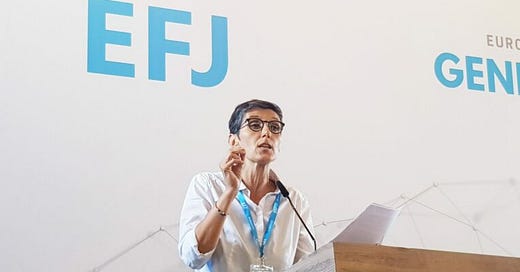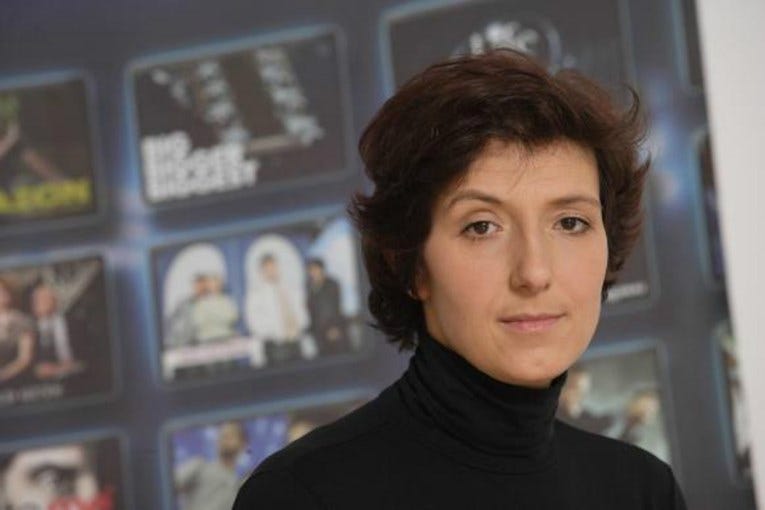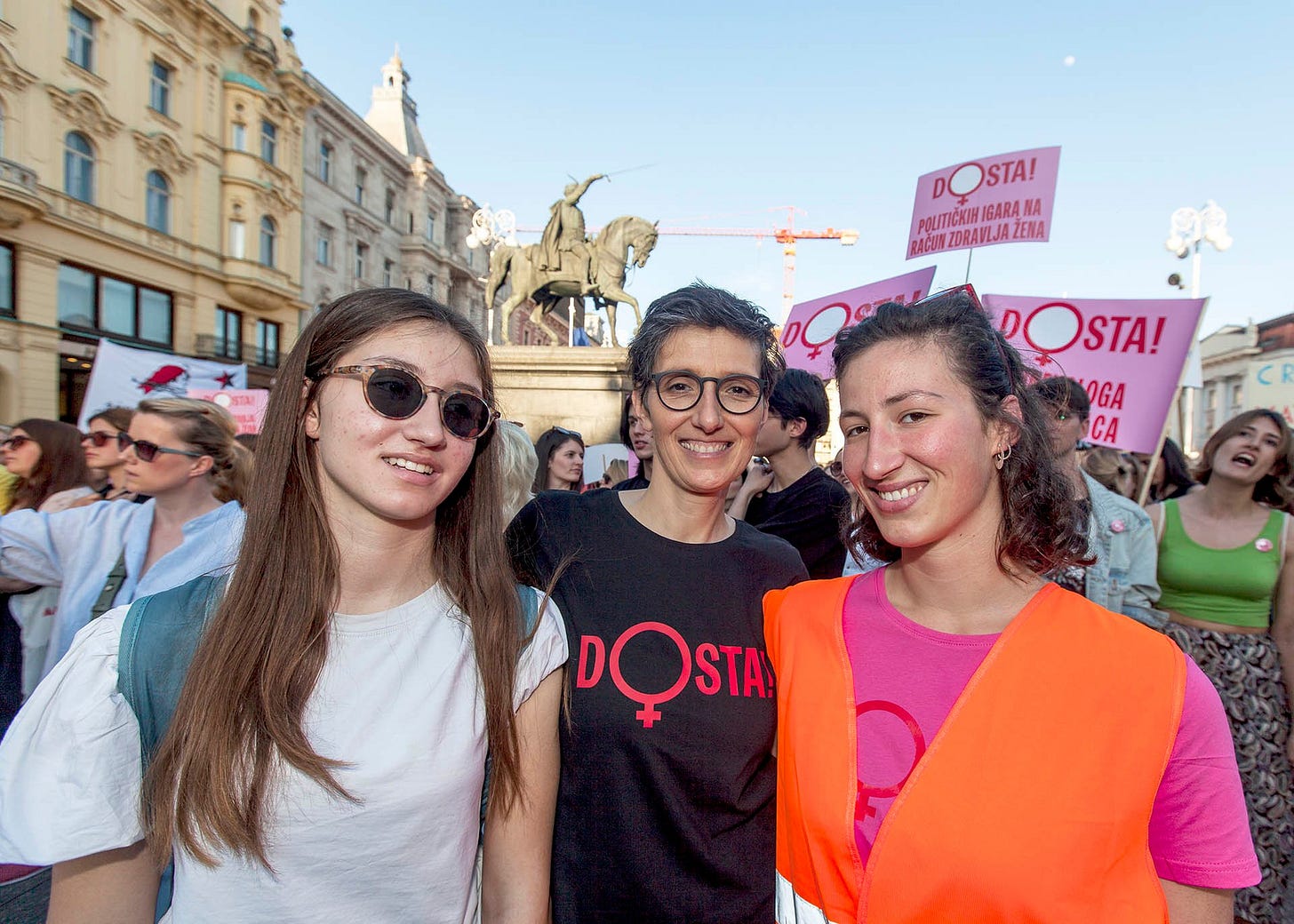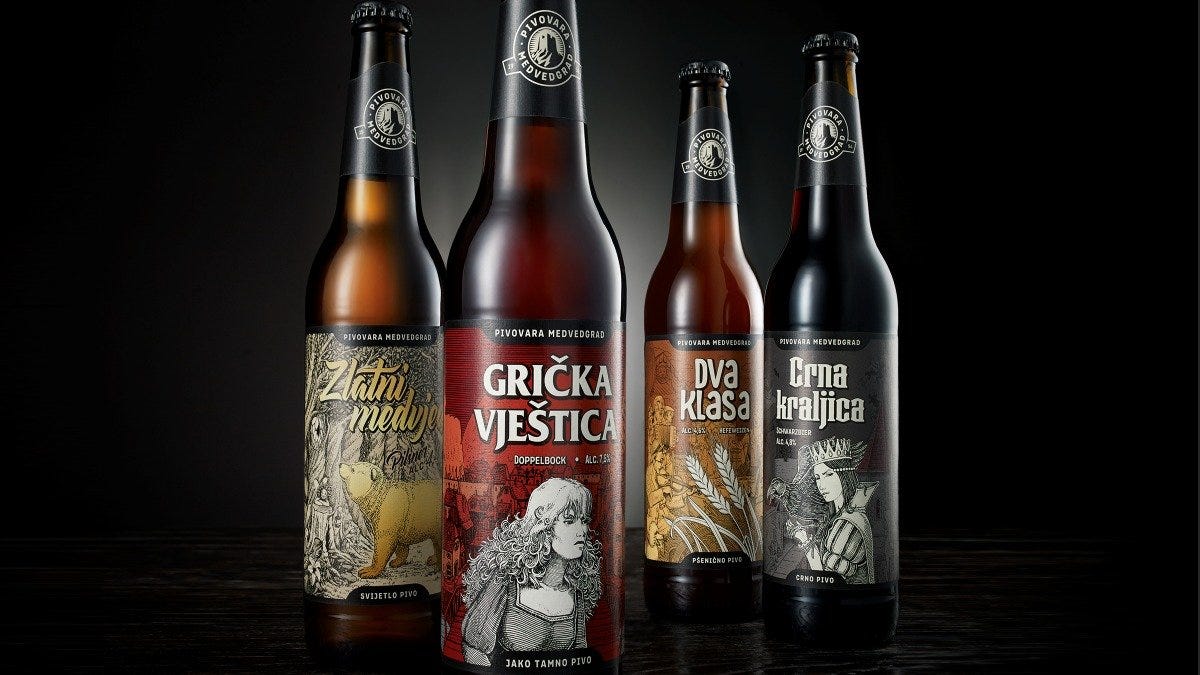S3E3. Fighting discrimination out loud
Interview with Maja Sever, first woman journalist to be elected President of the European Federation (EFJ). From war reporter during the Yugoslav Wars to guide for gender equality across the continent
Hi,
welcome back to BarBalkans, the newsletter (and website) with blurred boundaries.
What does it mean to become the first woman to be elected President of a European federation of professional organizations?
What does it mean to take the first steps in the world of journalism when your own country is in the middle of a fratricidal war, the first one in the continent after decades of peace?
And above all, how do you change a world that, despite protections and rights on paper, seems to move back against media freedom and to deepen gender discrimination?
The answer may differ from one to another. But today we welcome a guest who has tried to answer all these questions with her own personal and professional example.
Maja Sever, President of the Trade Union of Croatian Journalists (TUCJ) and, since June 14, 2022, also President of the European Federation of Journalists (EFJ).
This is not just a job
Maja, how did you start working as a journalist?
«I started on the Third Program of Croatian Television, mainly in programs for children and young people.
When the war started, everything stopped, including the program I was working for. I was transferred to news program as a war reporter.
In the meantime, I finished my studies in journalism and after the war I remained in the daily news program».
How was working in Croatia after the beginning of the Yugoslav Wars?
«Before the war, I had no real journalistic experience, I was a second-year student of journalism and worked part-time.
It is hard to be a war reporter, and it is especially hard in your own country. Often, it happened that I knew the people I filmed for my reports, from school or the same neighborhood. At that time, we were all in the middle of a bloody war.
We witnessed the separation of families we knew all our lives, the breaking up of friendships we grew up with.
War is terrible. I hoped nothing like that would ever happen again and I think that most people in my country thought “Oh my God, not again” in the morning of the attack on Ukraine».
What does this job represent to you?
«I think that journalism is definitely more than just a job for me. I think journalism is a way to point out problems.
Our work, as journalists, can change things for the best. Journalism as a public good is the reason why I love so much this job, the most beautiful in the world».
The fight for media freedom
How was the situation with media freedom in the Western Balkans in the Nineties?
«The country was in the middle of an armed conflict, it is difficult to talk about media freedom during that period.
However, if we draw a parallel with today’s situation, we cannot say that there was no space for freedom. At that time, Feral Tribune, a newspaper with sharp satire and critical articles, was published. Pressures and censorship were strong, but there were lots of brave and free colleagues».
And what about today?
«Today, journalists are exhausted. I don’t see any serious political will to strengthen freedom and media pluralism. As years go by, it is getting more difficult for journalists to work, their stamina is weakening.
After all, Croatia is a Member State of the European Union and this situation is stable. But many other countries in the region are still candidates for EU membership. The situation with media freedom in those countries is problematic».

What are the effects of the EU enlargement policy (and its difficulties) on journalism in the Western Balkans?
«Croatia and Slovenia are obliged to respect EU laws and directives, we have European Union funds at our disposal.
A colleague at the Free European Media Conference 2022 in Gdansk said that mechanisms and systems for the protection of freedom of journalism are easy to apply in countries where there is political will and a solid framework.
But I am afraid that this is just a wish list for us. There is still much to be built in these areas, in order to ensure systematic protection of media freedom».
Will the EU be able to set a standard for the protection of journalists throughout Europe?
«I support the idea of the European Media Freedom Act. It is necessary, since it has identified many key issues where the European Union and the Member States must act urgently to protect media freedom.
However, if the European Media Freedom Act wants to become effective in the fight for the media pluralism, protection of journalists’ rights and ensuring editorial independence from the influence of vested commercial and political interests, it should strengthen efforts to increase transparency of media ownership with clear rules, instead of soft legal recommendations.
Moreover, it has to introduce rules to regulate all financial relations between the State and media and to remove the limitation of transparency of State advertising for more than one million inhabitants.
It must guarantee the independence of national regulators, as well as the independence of the European Media Services Board. Measures against the surveillance of journalists should be expanded and a general guarantee for the protection of sources should be provided».
Breaking the glass ceiling
Is it challenging to be the first woman at the head of European Federation of Journalists?
«I think that this is an important message. Also in our professional sector, women are paid less than men for the same work, we are more often exposed to attacks, it is more difficult for us to achieve a balance between private and work life.
But I don’t think that the election of a woman to this position did not happen before because of some bad intention. Our organization has been intensively dealing with the problems of gender equality in media and protection of women journalists for many years».
This issue concerns the majority of European national and local newsrooms. Why do you think this discrimination continues to happen?
«Honestly, it is hard for me to understand why someone is paid less for the same job, and that someone is most often a woman. I can’t find any explanation or logic.
For example, some researches show that women with postgraduate degrees studies or MBA business school have 26% lower salaries compared to equally educated men. And instead of decreasing with years of work experience, the gap in monthly earnings widens.
At the same time, the share of highly educated women is constantly increasing, overtaking men in our society as well. However, we still can’t overcome the gender gap or break the glass ceiling.
This situation is quite worrying, but also motivating. This is one of the reasons why I decided to I accept this role».
How will you fight against gender discrimination in the media sector?
«Loudly, of course! And systematically. In EFJ, we have formed an expert group for gender issues and we are fighting on several levels, by participating in all discussions that determine these issues. We are building a network of support, exchange of experiences and examples of good practice among member organizations.
Personally, I am ready to fight against every single case of discrimination and support female journalists against harassment, physical and psychological pressure.
And the EFJ is really working seriously and systematically to build a system for the protection of journalists. We are currently implementing an important Safety4journalist Project to strengthen our organizations, to educate and connect our colleagues throughout Europe».
Pit stop. Sittin’ at the BarBalkans
We have reached the end of this piece of road.
It is time for us to sit with our guest at our bar, the BarBalkans, that moved to one of the most interesting breweries in Zagreb.
Pivovara Medvedgrad is the largest craft brewery in Croatia, producing natural lagers in the traditional way since 1994.
The brewery’s name was picked according to an old Bavarian tradition of taking the name of the closest medieval fortified town, which in Zagreb’s case is Medvedgrad, overlooking the city from the Medvednica mountain.
The fermentation cellar has a storage capacity of 350 thousand liters of beer and the bottling line can fill 5 thousand bottles in an hour.
All the equipment is self-produced, with the support of a team of engineers, and the master brewers are trained at the Czech Beer Institute.
The house speciality is Pale Lager, but the variety is enormous. Because «we believe that every person’s favorite beer hides in their diversity!»
Let’s continue the BarBalkans journey. We will meet again in two weeks, for the 4th stop.
A big hug and have a good journey!
BarBalkans is a free newsletter. Behind these contents there is a lot of work undertaken.
If you want to help this project to improve, I kindly ask you to consider the possibility of donating. As a gift, every second Wednesday of the month you will receive a monthly article-podcast on the Yugoslav Wars, to find out what was happening in the Balkans - right in that month - 30 years ago.
You can listen to the preview of BarBalkans - Podcast on Spreaker and Spotify.
As always, I thank you for getting this far with me. Here you can find all the previous newsletters.
BarBalkans is on Instagram, Twitter, Facebook.
Pay attention! The first time you will receive the newsletter, it may go to spam, or to “Promotions Tab”, if you use Gmail. Just move it to “Inbox” and, on the top of the e-mail, flag the specific option to receive the next ones there.









